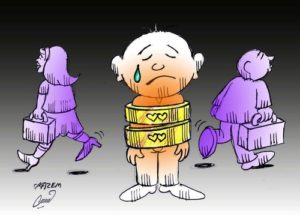COLUMNISTS | CHURCH MATTERS | Divorce – should Filipino Catholics be alarmed?
A protest against a proposed divorce law in the Philippines, AFP FILE PHOTO
.
.

It’s not yet approved on the third and final reading, but a Philippine Senate panel this month has the go-signal for a consolidated bill instituting divorce in the country. They said the approval is meant to safeguard the dignity of every person; to uphold the fundamental equality before law; and to protect the best interest of children. Really?
The Senate panel insisted that they will continue to recognize the sanctity of family. Really? It occurred to me: How can the family be strengthened and sanctified when there’s no commitment and when spouses easily change partners like changing diapers. Recall that in March 2023 the House population and family relations committee approved a bill instituting the dissolution of marriage.
Our honorable lawmakers are convinced that some marriages and relationships simply don’t work. Of course, “there is no perfect family,” as Pope Francis has put it. Realistically, “we don’t have perfect parents, we are not perfect, we don’t get married with a perfect person.” England’s Princess Diana of Wales (1961-1997) knew this quite well and yet, until the end, she believed that “the family is the most important thing in the world.”
Therefore, for some Senators and House members, divorce is the best solution to persistent marital problems. For them, divorce will create a healthier household environment for everybody involved because it is not good to survive in an unhealthy relationship. The healthier household environment gets people into a better mental and physical shape, increases self-confidence, and brings empowerment and personal growth. Really?
Au contraire, the negative consequences of divorce are well-documented by research-based studies in sociology. In the United States alone, more than half of all valid marriages in the contemporary age are terminated by divorce, and more than half of all children have spent time in a single parent home by the time they reach age 18. Is this good?
Divorce helps stimulate some accent on individualism and vice versa, that is, individualism stimulates the couple to decide to divorce, researchers say. For most individuals, personal happiness is highlighted. Therefore, if love seems to fade and a spouse does not achieve the expected happiness in marriage, the most logical solution is to dissolve that relationship.
Unfortunately, one sad consequence of the emphasis on individual happiness is a craze toward less commitment to marriage and greater acceptance of divorce, cohabitation, and alternatives to marriage. Is this good?
Reputable non-Catholic sociologists specializing in marriage and divorce, such as Mastekaasa, P. R. Amato, Waite & Gallagher, McManus & DiPrete, G. Duncan & S. Hoffman, and many others confirm that compared with married persons, divorced persons tend to have lower levels of psychological well-being, less happiness, more health problems, and more economic hardship. Cross national data have corroborated similar findings in several nations.
According to them, the emotional effects of divorce on children are devastating and that children of divorced parents are more likely to themselves divorce (The Journal of Young Investigators, 2007).
“Love seeks to be definitive; it cannot be an arrangement ‘until further notice’,” we insist (Catechism of the Catholic Church, 1646). Thus, when President Ferdinand Edralin Marcos was married to Imelda Romualdez in 1954 and when his son, President Bongbong Marcos, was married to Atty. Liza Araneta in Italy in 1993, they knew they entered into a covenant blessed by God that is heterosexual and monogamous. They knew they entered into a commitment that is lifetime, “hindi tulad nang pagsubo ng kain na iluluwa kapag napaso.”
When in 1966 Joe Biden married Neilia Hunter in a Roman Catholic wedding in 1966, they vowed, “until death do us part.” Because of his commitment, Joe Biden married his second wife, teacher Jill Tracy, only after his wife Neilia died in an automobile accident in 1972.
In the same manner, Prince Charles and Princess Diana in 1981 made a solemn and public promise: “For better or worse, in sickness and in health… until death do us part” in accordance with the Anglican Book of Common Prayer. The almost “perfect” couple was solemnly married in the presence of 2,650 VIP guests, mostly of royal blood, and their public exchange of vows was the envy of the world. In 1996, the royal couple decided to divorce. Not surprisingly, Diana felt crestfallen and dejected, and met her tragic death a year after, an event that shocked the world and traumatized her kids, William and Harry.
For centuries, England has had a divorce law, and its King, Henry VIII (1491-1547) was married six times. And every school kid in Great Britain today knows the rhyme: “divorced, beheaded, died, divorced, beheaded, survived,” pertaining to the six wives in succession. King Henry VIII became infamous when he divorced his first wife to marry Anne Boleyn when he did not get an annulment from the pope. Divorce is not an annulment. Divorce ends a valid and sanctified marriage, the termination of marital union.
In the Catholic Church, a marriage is valid until proven otherwise (lack of full consent, a partner was previously married, age requirement, and other impediments). Annulment means there was no valid marriage from the beginning; hence it never existed, and therefore it is void. But Henry VIII’s marriage to Catherine of Aragon was valid. And he wasn’t able to prove otherwise.
Because the Catholic Church did not approve his desire to annul because Matrimony is neither a signed paper nor a formal suggestion only. And because he didn’t like the disapproval, England broke away from the Catholic Church. Henry VIII, who once carried the glorious title of the “Defender of the Church,” made himself the “Supreme Head of the Church of England” in 1531 to fulfill his endless caprices and whims.
Besides the sociological studies, there is one moral reason why divorce remains the same, that is, it’a evil and immoral. Why? Because God says so. The Bible – with the Catholic tradition and magisterium – defends the indissolubility of marriage, even if some Senators and Congressmen have argued that Israel, the country of Jesus Christ by birth, has a divorce law and that the Philippines is the earth’s last bastion of absolute marriage and the Vatican is the only other State with no divorce law.
“Therefore, what God has joined together, let no one separate” (Mark 10:9).
…………
Dr. Jose Mario Bautista Maximiano is the Lead Convenor of the Love Our Pope Movement (LOPM) and the author of “Church Reforms – Semper Purificanda” Volume One (Claretian, 2023).
 Memento Maxima Digital Marketing
Memento Maxima Digital Marketing
@[email protected]
SPACE RESERVE FOR ADVERTISTMENT


 Memento Maxima Digital Marketing
Memento Maxima Digital Marketing






